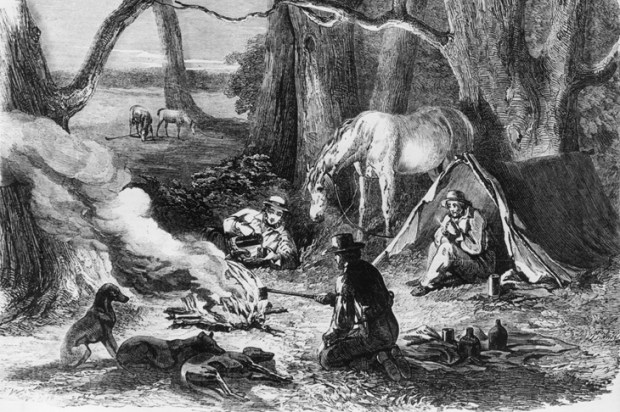Nothing bad happened before Australian colonisation in 1788, or good after it.
Apart from a modern first-world economy and democracy, the establishment of a social safety net of education and health. Ipads… Other things… John Cleese was honest with his fellow revolutionaries in the People’s Front of Judea when he said something similar. He was speaking about the Roman Empire.
What have the Romans ever done for us? – Monty Python pic.twitter.com/eEf7EWrAWH
— Critical Stress? (@criticalstressy) May 15, 2024
Our early 1850s democracy, for example, was rather remarkable.
Local Parliaments in New South Wales, Victoria, and South Australia gave all men the vote from 1856-58. They gave them the secret ballot and self-government. They included Aboriginal and Chinese men in the vote, despite conflicts on the goldfields and elsewhere. Women got the vote in South Australia in 1895.
Britain empowered local Parliaments to draft these democracies. Then they largely stood aside and let the colonists argue it out. They had become liberal-minded, and it was thought best not to generate another American revolution. Even the Canadians, largely loyalists who had fled the American Revolution, had an insurrection over self-government in 1837 after all.
Almost nowhere else was as democratic as Australia. America probably was, but also had the ‘peculiar institution’ of slavery. In Britain, only one in five men had the vote. France had continuing revolutions, reactionary to liberal, monarchical to republican, even from one royal house to another. Nothing was settled.
South America had continuous revolutions; Argentina, perhaps twenty… The result was much death and dislocation, the domination of large landowners, and a lower standard of living than in Australia. Ordinary people did not prosper. By contrast, in Australia the ‘squatters’ were largely defeated over land reform and were unwillingly controlled by democratic Parliaments. Ordinary people prospered, in fact ‘rode on the sheep’s back’.
These were flawed democracies with less democratic upper houses, and unequal electorates. ‘One sheep one vote’ was Whitlam Minister Fred Daly’s joke in the 1970s as unequal electorates were ended.
It must now be very difficult to service the electorate of Durack, over half of Western Australia, and other massive country electorates, bigger than some European countries. A bit more difficult than wandering through a small Melbourne, Sydney or Brisbane inner-city electorate.
The Australian Upper Houses of Parliament introduced in the 1850s copied the ‘mixed’ British constitution of the time. The vision of Edmund Burke and William Blackstone, and the Whig party, was that neither property nor the people would prevail, rather there would be ‘perpetual compromise’ and Parliament would rule.
A Whig upper house survived until 1973 in South Australia, defended to the end as preventing radical change that would not be the permanent will of the people, or preventing ‘class legislation,’ similarly in NSW until 1978.
Australian self-government was chaotic, but the balance was with the people, not property. The system therefore lasted. Political crises between the democratic Legislative Assemblies and less democratic Legislative Councils did not lead to insurrection and violence but led to contested land reform. It was an agricultural and pastoral economy where ordinary people wanted land.
There were lasting innovations such as the secret ballot, Torrens title of 1858, and the Victorian wages boards of 1896. All had worldwide influence.
The debates of the 1850s that led to these radical democracies are almost completely neglected. There is no one record of them available. To fill the gap I wrote, The Australian Horn of Plenty – How Britain’s Australian Colonies Began Democracy which reveals their true nature. It is I hope readable.
The people who introduced this early and successful democracy are almost forgotten. ‘Slippery Charlie’ Cowper, Premier of NSW in 1858, gave all men the vote. The Colonial Treasurer, Robert Campbell, said that they were just copying the ancient Saxons. Hardly revolutionary, he said! Premier William Haines introduced all men to the vote in Victoria in 1857 under the shadow of the violent Eureka stockade. The even more radical South Australians gave all men the vote in 1856, after spending themselves ending State aid to religion, which was the preoccupation of the rather fierce Protestant dissenters who settled there.
One thing that unifies us as a nation is our robust democracy under the Southern Cross. All our political parties of government are committed democrats.
There should be more popular focus on this. Even if we spend Australia Day in ‘quiet reflection’ rather than celebration, a minority view, we could remember these events.
Our traditional preoccupations are drafting and then debating unsuccessful Constitutional amendments.
We can keep doing this while remembering our remarkable early democracy, without revolution. Britain did not give all men the vote until 1918, and most countries in Europe, Asia, and the rest of the world had a far more difficult and violent path to modern democracy and a first-world economy than we did.
We should be grateful for this. There are many who would have died or starved if we had followed the usual world path.
Our modern parliamentarians should be as successful at proportional practical policy-making as the 1850s parliamentarians were.
A federal election is imminent; we need to robustly assess the clashing political platforms. How do we avoid magic pudding policy-making? How do we sufficiently stress the need to protect and increase living standards by increasing productivity? The future is always an experiment which we assess through a glass darkly. Our 1850s leaders saw clearly and we can too.
Reg Hamilton, Adjunct Professor CQU, former Deputy President of the Fair Work Commission. Copies of the book can be purchased from Routledge. It is on free access here.

























